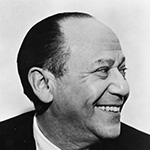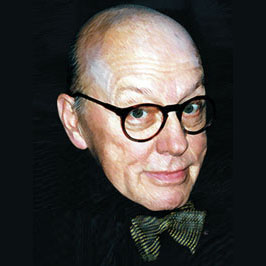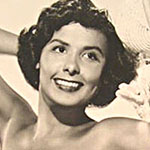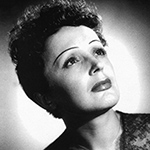May/June 2020
Ivie Anderson
By Marilyn Lester
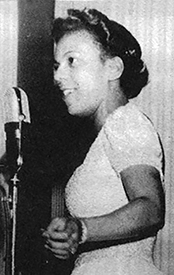
Ivie Anderson was the great Duke Ellington’s first regular band singer,
joining the orchestra in 1931 and staying with him until ill health forced her to retire in 1942.
She was born on July 10, 1904 and raised primarily in Gilroy, CA, where she learned to sing at St. Mary’s Convent school. She also received two years of vocal training with Sara Ritt at the Nunnie H. Burroughs Institution in Washington, D.C. Anderson returned to Los Angeles and at the age of 17 began singing professionally. She was in the 1923 production of Shuffle Along, sang with several big bands of the day, and then toured as a solo singer, attaining a modest level of success.
Meanwhile, Ellington, who’d risen to fame with his residency at the famed Cotton Club from 1927 through 1930, was now touring, a circumstance that would continue for 50 years until his death in May 1974. In Chicago,
he decided he needed a full-time band singer. Anderson was sent to him from the Grand Terrace by fellow bandleader Earl Hines. After a two-week tryout, Anderson was hired, joining the band on February 13, 1931.
A petite figure, Anderson was described by author Barry Ulanov thusly: “With her neat coiffure, her impeccable clothes, her refined and delicate features, and her exquisite manner went an improper, rough voice, an impudent gesture, a sardonic smile that, in bewildering combination, tumbled audience after audience into her lap.” Privately, she was capable of some rough-and-tumble behavior, with an ability to swear like a sailor and best the band members in poker games.
Anderson’s vocals were noted for her timing, distinctive jazz phrasing, scatting ability, and genuine emotion. She often stated that Ellington, a master arranger, knew how to write accompaniments that fit her voice
perfectly. She was more than a singer; she was an entertainer who could dance up a storm and play for comedy. With Ellington drummer Sonny Greer, she established a routine whereby she would exchange quick-witted banter, as well as sing in response to his drumming. She also recorded with Ellington, scoring many hits. In 1933, she began performing “Stormy Weather” (Harold Arlen and Ted Koehler). Although Ethel Waters is often cited as the first to add the song to her repertoire, some historians credit Anderson, who had a hit with that recording, for that honor. Another of her hits and her signature song was Ellington’s “I Got It Bad and That Ain’t Good” (lyric by Paul Francis Webster).
By 1942 Anderson was suffering from chronic asthma, the demands of the road making it difficult for her to sing. With Billy Strayhorn, she scouted for her replacement, recruiting Betty Roché, who performed with the Ellington Orchestra for most of the 1940s. In August 1942, Anderson retired from the
Ellington band, settling permanently in Los Angeles. She was active in charity and social circles, opened a restaurant with her then-
husband, Marque Neal, and also continued to sing, mostly in nightclubs in California and occasionally in engagements farther afield.
Anderson died on December 28, 1949, after a three-week illness related to asthma. She was 45.
In his autobiography, Music Is My Mistress (published in 1973), Ellington said of Ivie Anderson: “They still talk about Ivie, and every girl singer we’ve had since has had to try to prevail over the Ivie Anderson image.” Jazz vocalists who’ve come since the era of Ivie Anderson most decidedly stand on her impressive shoulders.


